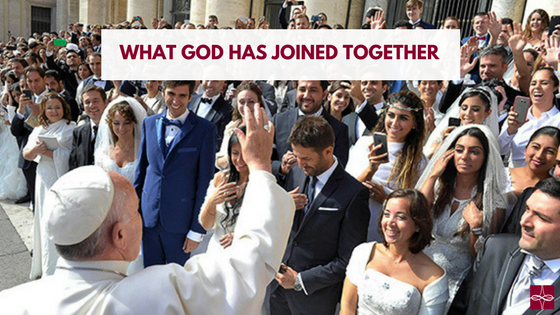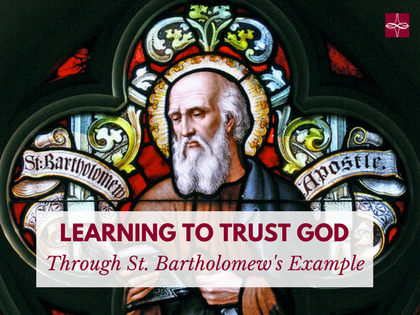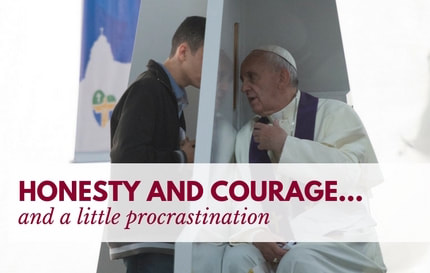|
No one ever told me that marriage prep would be easy, but as I soon discovered, it involves sacrifice, time management, communication, honesty, and humility. It demands both patience and inconvenience, and perhaps an uncomfortable truth or two. There's work to be done, yes, but this cannot compare to the countless joys and the excitement I share with my beloved. Preparation for marriage, however, does not conclude with the certificate of participation. The work continues and never stops! Our efforts may not be recorded by the diocese but are a natural part of this holy vocation. That afternoon, my fiancée and I were thankful for the work and sharing that was accomplished that day, but even more so for the time afterwards we had in order to further share, process, and discuss the details of our sacramental future together.
While this time of year may call to mind Valentine’s Day, the bishops of the United States have designated the observances of National Marriage Week (February 7-14) and World Marriage Day (Sunday, February 11) as “opportunities to focus on building a culture of life and love that begins with supporting and promoting marriage and the family.” The Church is invited to reflect on the role of marriage in the world and its influence on each of us, no matter our state in life. Of course, no two marriages are the same—a truth that reflects the beauty and depth of the sacrament and this mystery of love. Growing up, my parents were my first heroes. Their marriage was inspiring for a number of reasons, but I simply admired its endurance. Marriage, as they knew—and I am continuing to learn—is a lifelong commitment in the sight of God to offer the gift of self to one another in love and for the building of the domestic church, the family. Those called to marriage are entrusted with the awesome responsibility to answer God’s first command to humanity: be fruitful and multiply (Gaudium et spes 48). I was born out of my parent’s married love to bear witness to Love itself. Like my parents, my love is imperfect, yet I continue to offer it as they do: in order to sustain their marriage and continue to live out their vows to love each other in all circumstances of life. Seeing their efforts inspires and shapes my own for my future marriage. Thankfully, I can look not only to my parents’ example, but also to a number of saintly married couples whose lives of holiness are models for the rest of us. The heroic virtues that they exemplified through their marital love are a great source of encouragement and hope to those who face similar circumstances in their lives. My favorite is St. Gianna Molla and her husband, Pietro, who throughout their journey of love composed many beautiful letters to each other. In an increasingly secularized world where marriage is little more than cohabitation, holy couples such as the Mollas are refreshing witnesses to the sanctity of marriage and family life. They model for us the surrendering of all difficulties and hardships to God. Though marriage has its challenges and responsibilities, let us not be intimidated by the reality of this vocation! As in all the other sacraments, God’s grace flows throughout married life and sustains us through this calling. Yes, there are demands and difficulties, but these serve to purify our love in the example of Christ’s total and perfect love from the cross. As Pope Francis advised 10,000 engaged couples four years ago: We are all aware that the perfect family does not exist, nor does the perfect husband, nor the perfect wife. We exist, and we are sinners. Jesus, who knows us well, teaches us a secret: never let a day go by without asking forgiveness, or without restoring peace in your home. If we learn to apologize and forgive each other, the marriage will last. May the Holy Family pray for us as we continue to build the domestic church! For more resources on Marriage and Family, click here. Questions for Reflection: Can you think of examples in your own life of a married couple who lives out their vocation with joy? How has their witness impacted your understanding of marriage?
0 Comments
When I was at a recent Bible study with friends, we prayed about and discussed the passage from Matthew 14:22-33 – the story of Jesus calling Peter out of the boat to walk to him on water. As Peter sees the wind and waves around him, his trust in Jesus begins to falter and he starts to sink. When he cries out for help, Jesus immediately catches Peter, saying, “Oh you of little faith, why did you doubt?” In many ways, we, too, are like Peter: cautiously trusting the Lord, but when tested in the chaos, we learn our trust isn’t as strong as it should be. This is where we can look to St. Bartholomew for guidance. St. Bartholomew (also known as Nathanael), whose feast day is August 24th, was one of the 12 Apostles mentioned in the Synoptic Gospels. While little is known of St. Bartholomew, we see his true personality in John 1:43-51. The apostle Philip was a friend of Bartholomew, an Israelite. As Philip tells Bartholomew that he, Andrew, and Peter found the Son of God, St. Bartholomew responds, “Can anything good come from Nazareth?” Later, Jesus says of him, “Here is a true Israelite. There is no duplicity in him.” Jesus also says he saw Bartholomew under a fig tree before Philip called him, leading us to understand Bartholomew was in prayer with the Lord. St. Bartholomew immediately answers, “Rabbi, you are the Son of God; you are the King of Israel.” This passage reveals St. Bartholomew’s blunt honesty. He is open about his doubts of any good coming from Nazareth, but does not hesitate in his belief when Jesus reveals himself. This is why Jesus calls St. Bartholomew an Israelite with no deceit. Through St. Bartholomew, we see qualities that Jesus praises: honesty, truth seeking, sincerity and thoughtfulness. These good attributes allow Jesus to come into St. Bartholomew’s life and build trust with him. Likewise, St. Bartholomew is able to open up to new perspectives and ruminations on spiritual matters. In Matthew 5:8, we learn from the Beatitudes, “Blessed are the clean of heart, for they will see God.” St. Bartholomew is a model to us of this purity of heart. When we seek truth, we can more clearly see God and respond to his call. Living apart from the truth dims our relationship with God and our ability to hear his call. Dishonesty makes life more difficult for us to know the truth, which is built on trust. The Catechism of the Catholic faith says that “placing our trust in Christ’s promises and relying not on our own strength, but on the help of the grace of the Holy Spirit” enables us to become heirs in hope of eternal life. Ultimately, God is truth itself. We learn from St. Bartholomew’s example that we can come to know God better in reflection through prayer. To know God through prayer is to know truth and therefore trust. This open line of communication with God unlocks our minds to explore different perspectives and gives us the ability and willingness to overcome critiques, which is necessary for evangelization. Even in the above passage from Matthew 14:22-33, where Peter walks out onto the water, we learn at the very beginning of the story that Jesus found time to pray and reflect in solitude with his Father before meeting with the Apostles in the boat. St. Bartholomew’s prayer led him to truth. He trusted in God and then shared that truth with others in order to convert them to Christianity. After Jesus’ ascension, St. Bartholomew traveled farther than most of the other Apostles. He visited Syria, Ethiopia, India, and Armenia, preaching the Gospel and God’s word. It is believed St. Bartholomew was martyred in Armenia. May we learn to trust God through St. Bartholomew’s example! "The confession of evil works is the first beginning of good works." -St. Augustine I’ll come right out and say it: I dislike going to Confession. I really do. And so I avoid it like the plague. We all have our struggles in faith, and this is my biggest one. “Why do I have to seek out a priest, another human, and tell him all the bad things I’ve done? Can’t I just talk to God directly? Doesn’t God hear everything in your heart?” We’ve all heard these questions—challenges, really—about the need for regular visits to the confessional. After all, God does know everything in our hearts. We can talk to him directly, and we should do so often! But we need more than just that internal dialogue with God. Our faith, after all, isn’t one lived alone. St. Paul tells the Romans, “We, though many, are one body in Christ and individually parts of one another.” (Romans 12:5) I may be a toe, you may be an earlobe, but we all, collectively, make up the one Body of Christ in the Church. So if that’s what we truly believe, and one of those parts gets hurt, the whole rest of the body feels that pain. If you stub your toe, the whole of your body stops everything and focuses on that pain. So, too, when we stub our spiritual toe, we create a ripple throughout the rest of the Body. We could talk at length about the nature and effects of sin, but that’s for another discussion. The point is that each of our sins have an effect, not just on ourselves and on God, but on the whole of the Church, too. And so we have three people or groups to reconcile with when we’ve sinned: ourselves, our Creator, and the larger Body of which we are each a part. And who better to forgive our sins than a priest? He’s a spiritual father, a representative of the Church, and, most importantly, someone who acts “in persona Christi,” or “in the person of Christ.” By virtue of his ordination, each priest has been given some pretty awesome powers. He can baptize people, he can bless places and things, he can call down the power of God onto simple bread and wine, miraculously turning it into Christ’s Body and Blood. So if he can do all those things, can’t he also exercise the power Christ gave the Apostles after his Resurrection? “Whose sins you forgive are forgiven them, and whose sins you retain are retained.” (John 20:23) That’s crazy! But it’s our faith, and it comes from Christ himself. We profess this in the Apostle’s Creed: “I believe…in the forgiveness of sins…” Now we’re all thinking, “Okay, that’s all well and good, but Confession is still too uncomfortable.” And you’re right! It is. That’s why I dislike going. I don’t like being uncomfortable. I don’t like to acknowledge the messy parts of life, including my own failings and shortcomings. I don’t like to admit that I’m wrong, especially when I keep doing the same wrong thing over and over again. But every time I finally buck up the courage (sometimes after months or years) to walk into a confessional, I’m never disappointed. The result is always the same: God has forgiven me and wiped the slate clean. And I feel so good about it! It’s not that I’m afraid of God’s mercy. In fact, I crave it. The problem is that I’m too afraid of my own self, of my own fragile and broken humanity, to even ask for this mercy. In my heart of hearts, I don’t believe I deserve it. And that’s the thing: none of us deserve it. Not one of us can ever be sorry enough, contrite enough, penitent enough, to make amends for what we’ve done and continue to do over and over again. We can never fully make it up to God; that’s why he sent his Son. Jesus took the sins of the whole world on his shoulders, beaten and bloodied though He was, until he became sin itself: “For our sake he made him to be sin who did not know sin, so that we might become the righteousness of God in him.” (2 Corinthians 5:21). He took every sin each of us will ever commit, carried them up on the cross, and died as payment for it. He’s already paid the price for us. It’s like a spiritual gift card that never expires, but we have to use it to take advantage of the gift. That’s why Confession is so important: the mercy is guaranteed; we have but to ask for it. Pope St. John Paul II once said, “Confession is an act of honesty and courage - an act of entrusting ourselves, beyond sin, to the mercy of a loving and forgiving God.” In this Jubilee Year of Mercy, may we all be honest and courageous enough to do that. Whether you just went to Confession last week or, like me, have been putting it off for way too long, be courageous and just go. Let the Year of Mercy have some personal meaning for you, and let God forgive you for what He’s already paid for upfront. For more resources on Confession and the Jubilee Year of Mercy, please click here. Finding love takes patience and time. I am blessed to be in a relationship with someone I have known for over three years. What started as a friendship has become the kind of relationship I used to dream about. We love to do things like going on trips or just grocery shopping - it’s sharing experiences that means the most to us. Sometimes the littlest things are what we appreciate in each other, like how he knows how I like my coffee at any coffee shop. In return, I know that he likes ice in his glass of milk and likes getting homemade gifts for holidays and birthdays. I’ve tried to build both my friendships and relationship on shared experiences. I love getting to know someone, finding things in common, learning their interests, and spending time with that person. As a Catholic, I’ve tried to surround myself with people who support me and share my beliefs and focus in life. I get to wondering though, what is dating like for other Catholics? Where can we start?
Start at the beginning. In 1 Corinthians 13: 4-7 it says, “Love is patient and kind; love does not envy or boast; it is not arrogant or rude. It does not insist on its own way; it is not irritable or resentful; it does not rejoice at wrongdoing, but rejoices with the truth. Love bears all things, believes all things, hopes all things, endures all things.” This verse is a great place to start. When we appreciate God’s love for us, we can better understand how we deserve to be loved by others. Pope Francis speaks often about love, and when he visited the United States at the World Meeting of Families in Philadelphia, he said, “Love is shown by little things, by attention to small daily signs which make us feel at home. Faith grows when it is lived and shaped by love. That is why our families, our homes, are true domestic churches.” So whether you are in a relationship or not, here is a list of little things to remember as you persevere in your lives.
For all of you who are dating, see if you are incorporating these tips into your relationship. If not, give some of them a try. For those of you reading this who are not in relationships, some of these tips can really help friendships and even relationships down the road. I’ve found that with patience and effort, the little things will amount to bigger memories. In the meantime, it’s the little things that make a relationship resilient. The “I love you!”s and the laughter can be the little things that take the day-to-day interactions and turn them into months and years spending time with someone you care about. For resources on Marriage and Family, please click here. |
Details
Archives
July 2024
Categories
All
|
About |
Media |
© COPYRIGHT 2024 | ALL RIGHTS RESERVED









 RSS Feed
RSS Feed